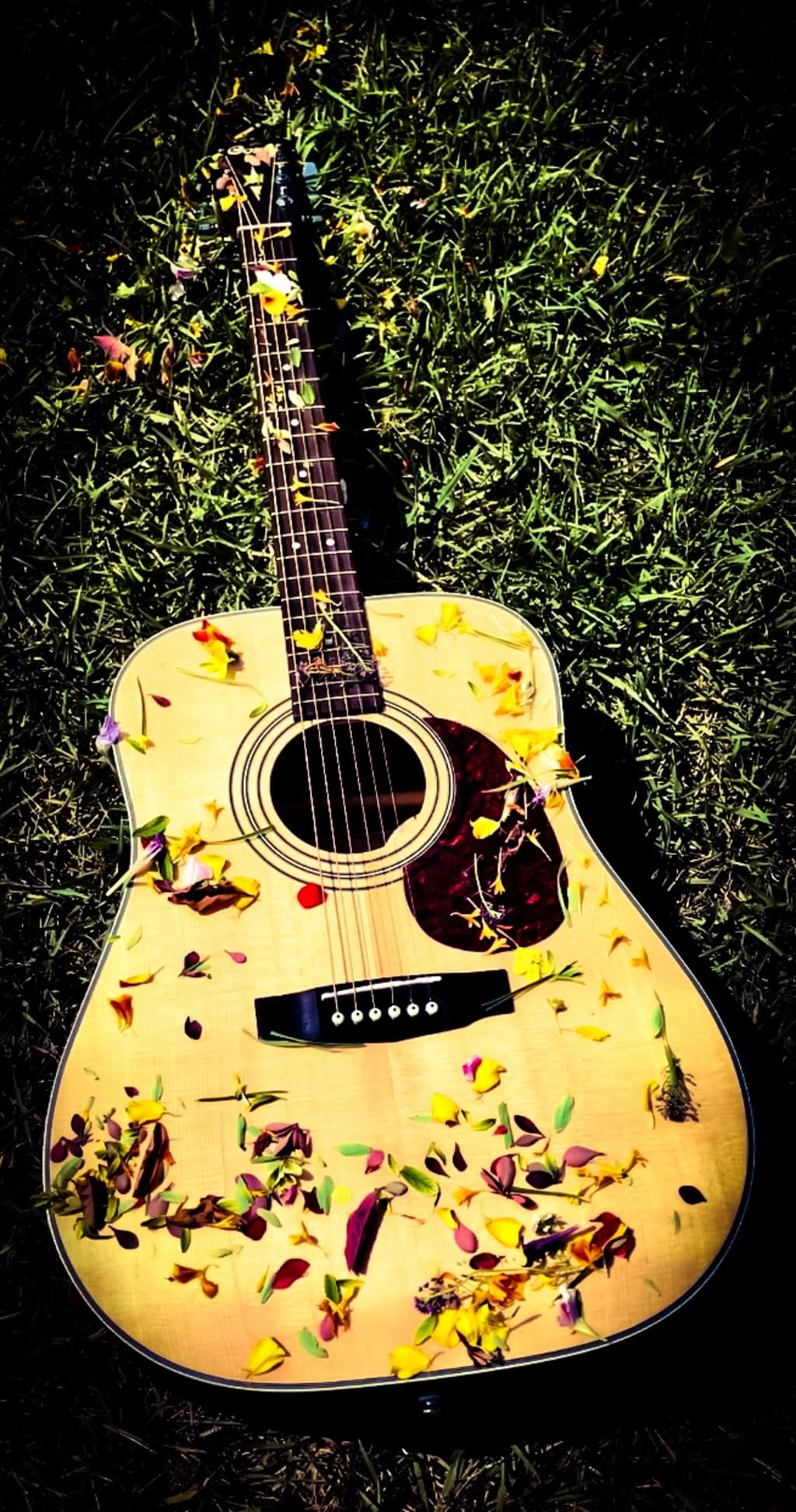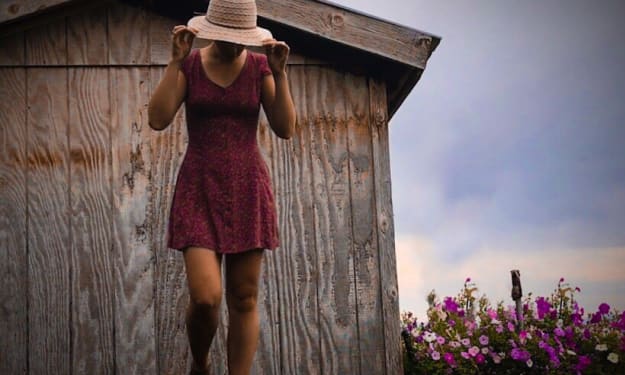Singing Ugly
Music is ugly, and we should be glad that it is.

“Listen, baby,” she’d said all those years ago. “Music is ugly. It is ugly and hard to look properly in the eye.”
“Music has eyes?” I’d asked.
“You bet it does. Eyes to stare into the depths of your soul, in places you don’t want anyone to be able to see. It sees. It looks at your darkest parts without flinching.”
“But Mama, if music is ugly…then why does it sound so pretty when you play?”
“Baby, it’s because you can’t judge a song by the sound of it. You’re not really listening if you only hear the notes with your ears. You have to hear them with your heart, too. You have to let the song’s ugliness take root there, and grow. And once it’s done with you, then you can let it out.”
“I don’t think I want ugliness inside of me.” I’d made a face and crossed my arms to protect my heart from the ugly music that wanted to grow there.
Mama had clucked her tongue then, and stroked my hair.
“Sweetie, you’re only seven, so you don’t know yet. But except for the little tiniest of babies, everybody’s got ugliness inside of them.”
“Even me, Mama?”
“Even you. Remember yesterday at school when you pushed Porter Joel off the swing?”
“It was my swing first. I told you, Mama. He took it from me and I had to get it back.”
“But you still got angry, didn’t you? Don’t you think that anger was a little bit ugly? Don’t you think hurting Porter Joel was ugly?”
I’d frowned at my shoes.
“Yeah, I guess.”
“There are all kinds of ugly emotions, like anger. Everybody has them. Everybody has that ugliness inside of them.”
“I don’t want to be ugly, Mama.”
“Oh, baby, you’re not ugly. Nobody is ugly. Ugliness can’t be seen; it can only be felt. That’s why music is ugly. It takes all of its pure ugliness and upends your insides. It fills you up until there’s no room for anger anymore. Or sadness. Or loneliness. It grows and grows until it pushes all of your inner-ugliness out. And then all you have left is the ugliness of the music, making you feel however it wants you to feel, looking into your ugliest parts with its soul-searching eyes and saying, ‘This isn’t so bad.’”
“Music can talk?”
“Music talks better than people do, baby girl. It can talk without words.”
“That doesn’t make any sense.”
And then she had kissed me on top of the head, whispering, “Someday, it will.”
At her funeral, some people said that Mama’s music was the best they’d ever heard. I think it’s true. But I also think they only said that because she died, and they thought it was a nice thing to say about a dead person. And I was only eight at the time. What else could they have said, really, to an eight-year-old who’d just lost her mother?
But that was a long time ago, in a place I can reach only in memories. And Mama exists only in the grooves of her old guitar, and the photographs I have plastered to the inside of my closet door. I would have put them where I could see them, but Aunt Sylvie is very protective of her walls. She's the opposite of Mama in every way. She likes clean, white walls, and schedules and lists, good grades and ivy-league college aspirations. She likes consistency, and salad dressing on the side instead of on top. And she thinks music is something nice to listen to every once in a while—in elevators.
Aunt Sylvie is Mama’s sister, but they didn’t get along much. I met her for the first time at Mama’s funeral, and they told me I would be going home with her… a couple thousand miles away. Three years later and Aunt Sylvie still likes to pretend that she never had a sister, even though she said some very nice things at the funeral. She told everyone there that Mama was a free spirit who always had a song in her mouth. Or something like that. I’m probably remembering the words wrong. Anyway, she looks sad when people talk to her about Mama. It’s the only time she ever looks sad.
The first time I took Mama’s guitar out of its case, Aunt Sylvie lost control of her temper. She’s normally very in control of her emotions, so it was a little frightening when she started yelling at me to “Put that cursed thing away! Never play it in my house again, do you hear?”
The second time I took Mama’s guitar out of its case, I was far away from Aunt Sylvie and her house. Mama had taught me some basic chords before she died, so I knew a few songs—songs that we used to play and sing together. My fingers were still too small to play anything other than what I already knew, but playing those songs made me feel like the ugliness inside of me was being dug out with a great-big spoon. It felt sad, but like I was healing at the same time. It made me feel as though Mama was sitting next to me telling me that music is ugly, and we should be glad that it is. That’s why, every day after school, I would carry the giant instrument three blocks to the park, sit on my bench by the big maple tree, and play all the songs I could remember, even humming or singing along if I thought I was alone enough.
The music teacher, Ms. Gordon, asked me to stay after class one day. She asked me why I’m so quiet when I sing. She said I have a lovely voice, and I should be proud to share it with other people. I think she was a little confused when I told her that I can’t share it with anyone else, because the ugliness inside of me isn’t ready to let go of the ugliness of the music. It still has a lot of growing to do before it's done with me.
The first time I shared the music was after school in the auditorium, when the only other person around was Ms. Gordon. She’d just spent the last hour and a half watching her students one by one as they’d auditioned for the school talent show. I had been sitting in the very back with Mama’s guitar resting heavily on my lap as I tried to convince myself to go next. No, next. No… next. And then it was just me and Ms. Gordon, and she didn’t even know I was there.
I’d just had the thought to run—run before she could see me and force me to participate—when she started speaking. She was on the phone, and she sounded tired.
“It’s me. I just finished. No, no… not tonight. I’ll visit him in the morning. Before school. What did the doctor say? Is he okay? Good. Good. Get some sleep, then, sweetie. I’ll call you tomorrow.”
It wasn’t hard to figure out. Ms. Gordon loved someone who was very sick, just like I did before Mama died. And realizing that, I think, is what made me stand up and march my Mama’s guitar to the stage.
Ms. Gordon was surprised to see me, of course.
Before she could say anything, though, I told her, “I would like to audition now. But not for the talent show.”
“Oh? What are you auditioning for, then?”
“For you.”
And then I took Mama’s guitar from its case for the 143rd time, and I sang the song that Mama sang to me two weeks before she died. The song spoke to Ms. Gordon in a way that people can’t speak, and with its eyes it looked into her darkest parts without flinching. I could see the ugliness growing inside of her, and watched as the music made Ms. Gordon cry like I’ve never seen a teacher cry before.
When the song ended, she wiped her eyes and took a deep breath, letting the ugliness go. She told me that I should be in the talent show, that more people needed to hear how beautifully I could sing. But I shook my head, because music wasn’t beautiful, and she didn’t understand. There were still people, people like Aunt Sylvie, who didn’t want the ugliness of the music inside of them. They were afraid of it, for some reason, and fear makes people angry. So I decided to keep keeping it to myself, until Aunt Sylvie wasn’t afraid anymore.
I made myself brave one day and I asked Aunt Sylvie why she hates the music.
She told me she doesn’t hate music. She just doesn’t have time to listen.
I didn’t believe her, so I said, “Is it because you don’t want the ugliness inside of you?”
I think my words scared her, though, because her eyes got really big and she started yelling at me never to say something like that ever again, do you hear?
She came into my room later that night. Her eyes were normal-sized again, and her voice was soft when she said, “Before he died, my papa—your grandpa—he used to tell me and your mama all the time that music was ugly. He would say ‘sunshine and rainbows don’t solve every problem. That’s why we have music. Music is made from the depths of tortured souls. It comes out raw and ugly, created to counteract every ugly thing by being uglier than everything else. The uglier the song, the better.’ And I thought he was weird for saying things like that, but not Haisley. Not your mama. She thought he was the most brilliant man in the world.”
“Wasn’t he?” I’d asked.
“No. He was just an old man with an old guitar who drank too much whiskey before getting into his car.”
Mama had never told me how Grandpa died, only that he'd left his old guitar to her when he passed. That’s how she got it. That’s how I got it. Maybe that’s why Aunt Sylvie thinks it’s cursed.
“I’m singing in the school talent show,” I told Aunt Sylvie, and I don’t know why I told her that because it was mostly a lie.
She just nodded and said, “Extracurriculars look great on college applications.”
“Will you come to the show?”
Her eyes had drifted toward the closet where I think she knows Mama’s guitar likes to hide. She stared at the closed door for too long, and then left my room without answering.
In the two weeks leading up to the talent show, I practiced in the park by the big maple tree like I actually intended to sing at the talent show. I remember watching Mama on stage when she did her shows at Babb’s Pickle Barn. Everybody loved her; you could see it in their eyes, not a drop of that inner-ugliness left in them. She’d always known how to draw all the ugliness out of people and send it to some far-off place, just by playing a few songs on her guitar. I wanted to know if maybe I could do that, too.
On the day of the talent show, I wore my nicest dress to school, and Ms. Gordon was giving me hopeful looks all during music class.
The talent show started at 6:00 PM on the dot. I was backstage with everyone else, watching nervously as, one by one, my fellow classmates performed. Some of them danced, some of them sang or played instruments, some of them recited poetry, and one kid pulled a rubber chicken out of a black top hat. Mama’s guitar was still in its case, and I hugged it to my body like a child hugs her mother.
When the last performer exited the stage, Ms. Gordon took his place. She put her mouth to the microphone and glanced in my direction, giving me an encouraging little smile. I took Mama’s guitar out of its case for the 159th time.
“I think we have one more student to perform,” Ms. Gordon said to the audience. She announced my name. She even announced Mama’s guitar, even though she called it my guitar. She asked everyone to welcome me to the stage, and all of the people in the auditorium started clapping for me.
I didn’t move. I forgot all about the ugliness of the music. There was something else inside of me—something worse—and it froze me like a guitar-playing statue.
That’s when I heard Aunt Sylvie say, “Well? What are you waiting for?”
Aunt Sylvie was behind me with fidgeting hands. She wrinkled the hem of her blouse and moved on to a strand of her light hair, pursing her lips in the rare way she does when she’s losing control of her emotions.
“I’m scared,” I told her.
She shook her head. “Fear is just part of the ugliness inside of you, baby girl. Play your music, let it grow from your heart. Do that, and you won’t have any room left for fear.”
I looked at her and her fidgeting hands and asked, “Are you sure you want to hear it?”
She paused, then sighed, then brushed the wrinkles from her blouse. She knelt in front of me and cupped my cheeks in her hands that were no longer fidgeting.
“Holding that thing, I swear you look just like your mama. And do you know what your mama would do right now?”
“She would sing.”
“That’s right. She would sing. She would sing the ugliest song she knew. And what do you think she would want you to do right now?”
“She would want me to sing.”
“Sing what?”
“Sing the ugliest song I know.”
“That’s right, baby girl. That’s exactly right. Now get out there and make your mama, your grandpa, and your Aunt Sylvie proud.”
When I looked at Aunt Sylvie again, she was standing just behind the curtain, watching me as I sang from the middle of the stage. She had tears in her eyes—tears for her papa, for her baby sister, and tears for me as I played Mama’s old guitar, the steel strings pressed into the grooves she made familiar for them….
Singing ugly for the ugliness inside of us all.






Comments
There are no comments for this story
Be the first to respond and start the conversation.